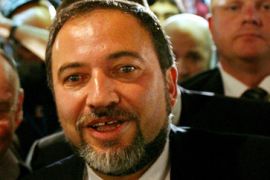Profile: Avigdor Lieberman
The ultra-nationalist politician is expected to win more seats in parliament.

 |
| Avigdor Lieberman emerged more popular after the Gaza war [GALLO/GETTY] |
Avigdor Lieberman, the head of the ultra-nationalist Yisrael Beitenu (Israel is Our Home) party, is poised to become a powerful player in Israel’s domestic policies.
Polls held a few days before the February 10 elections have given Lieberman, an immigrant from Moldova in the former Soviet Union where he once worked as a nightclub bouncer, an edge over the centre-left Labour party, which ruled Israel for more than 30 years.
The party that first entered the Knesset in 1998 with four seats, is now predicted to win 15-18 seats.
Prior to the Gaza war, Lieberman’s party was expected to keep to its 11 seats in the 120-member Knesset, mostly due to core support from fellow immigrants from the ex-Soviet Union.
But after the war, with security topping the agenda, the 50-year-old gained popularity with other Israelis who were disappointed that the Gaza war ended with Hamas still in power, disenchanted with career politicians and exhausted by the region’s never-ending violence.
Iron-fist approach
Some commentators say Lieberman brings a much-needed iron fist to domestic politics while others have called his policies racist.
During his election campaign, Lieberman focused on ways to deal with “disloyal” Israeli Arabs which he has called Israel’s “The Main Threat”.
The man who worked at a nightclub in the desert city of Beersheva after immigrating from Moldova in 1978, advocates throwing out Arab citizens who refuse to pledge loyalty to the Jewish state.
As a resident of a Jewish settlement in the occupied West Bank, he wants to keep major settlement blocs in exchange for transferring areas with heavy concentration of Israeli Arabs to a future Palestinian state.
In the three years since the last elections, he has called for the execution of Israeli Arab MPs who had had dealings with Hamas, for Gaza to be “treated like Chechnya” and for Israel to fight Hamas “just like the United States did with the Japanese in World War II”.
Such statements have bolstered his image as a strong hand, especially among first-time, non-Russian Israeli voters who mirror the nation’s shift to the right and are supporting him, pollsters say.
However, other Israeli politicians, such as Shimon Peres, the Israeli president, have criticised Lieberman for his suggestions of heavy-handed tactics.
Experienced politican
In 1999, Lieberman was elected to the Knesset where he served as chairman of the Israel-Moldova Parliamentary Friendship League.
In March 2001, Lieberman was appointed minister of national infrastructure, but resigned the post only a year later.
He became the minister of transportation in 2003 but was fired a year later by Ariel Sharon, the then Israeli prime minister, after he voiced strong opposition to the latter’s Gaza disengagement plan.
With his party likely to increase its seats in parliament, Lieberman will become a coalition builder with any party that emerges as the majority winner in parliament.
The Yisrael Beitenu party previously entered a coalition with Ehud Olmert, the caretaker prime minister, in 2006, whereby Lieberman was appointed the deputy prime minister and minister of strategic affairs.
This was a new position that was created to counter what were perceived to be Iranian threats.
In January 2008, however, Lieberman withdrew his party from the coalition.